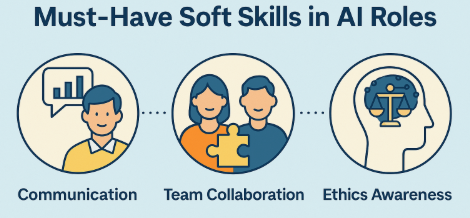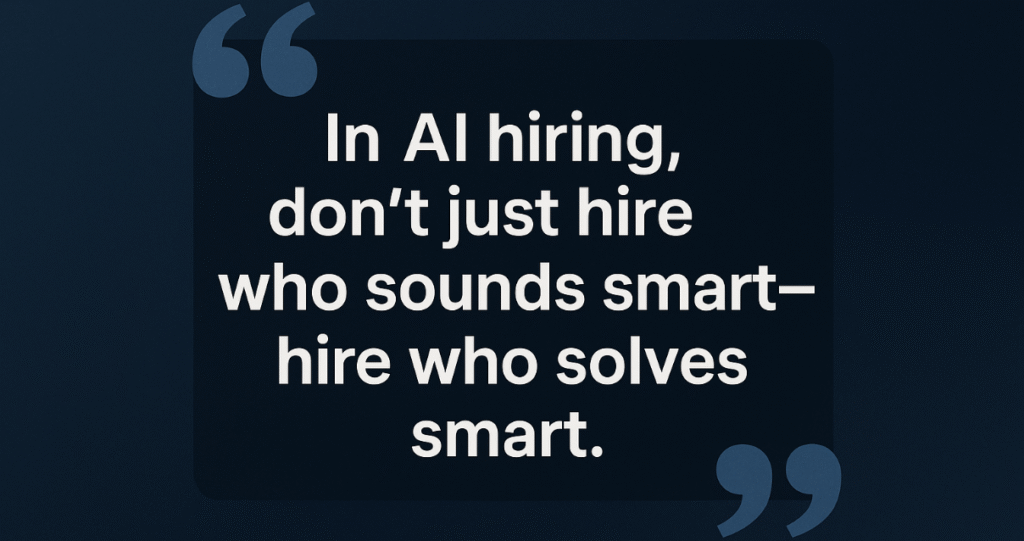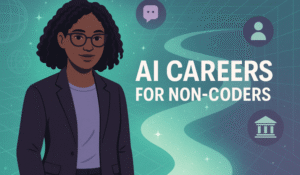The Rise of Intelligent Hiring: How One Mistake Led to My AI Recruiting Breakthrough
Back in 2017, I almost dismissed a resume that didn’t mention Google or MIT—but that candidate turned out to be the lead architect behind a billion-dollar AI breakthrough. What was my mistake? I didn’t understand the key AI skills recruiters look for. I was filtering for prestige over proficiency, buzzwords over real-world impact. That moment shattered my assumptions and reshaped how I evaluate AI talent.
Since then, I’ve interviewed hundreds of AI professionals—from self-taught coders to PhDs—and I’ve learned that the most impactful contributors often come from unconventional paths. The flashy credentials? Nice to have. But true AI talent reveals itself in how someone approaches a problem, iterates through data, and communicates results. Those are the real signals.
Fast forward to today: the AI landscape is evolving at breakneck speed. With generative AI tools, LLMs, and machine learning entering every business vertical, recruiters can’t rely on gut feelings anymore. It’s not about flashy résumés or trendy tech terms. It’s about spotting the right blend of skills, mindset, and experience.
In this guide, we’ll break down exactly what separates surface-level AI hype from the substance that drives business impact—because if you want to hire right, you need to know what truly matters.
Why AI Recruitment Needs to Evolve—Fast
The global AI market is projected to reach $1.8 trillion by 2030, according to PwC. That’s a staggering opportunity—and a massive challenge for recruiters.
Traditional hiring frameworks are failing to identify the real skills behind AI roles. Whether it’s data scientists, machine learning engineers, or prompt engineers, recruiters need to adapt to technically evaluate candidates, even without writing a line of code themselves.
Even if you’re not from a technical background, it’s absolutely possible to evaluate strong AI talent. Check out our guide on how to start a career in AI without coding to understand the non-tech pathways AI professionals often take.
That’s where understanding the key AI skills recruiters look for becomes your strategic edge.
Essential AI Recruiter Skills List to Stay Competitive
Let’s dive into a practical AI recruiter skills list to help you evaluate top candidates and make smarter hiring decisions.
1. Understanding of Core AI Concepts
You don’t need a Ph.D., but you do need to understand:
- Machine Learning (Supervised, Unsupervised, Reinforcement)
- Deep Learning (CNNs, RNNs, LLMs)
- NLP and Transformers (GPT, BERT, T5)
- AI pipelines and model lifecycle (data prep → training → deployment → monitoring)
🌸 Pro Tip: Use analogies to simplify. Think of an LLM like a highly-trained chef that’s read every recipe book on Earth and can now invent new dishes based on patterns.
2. Fluency in Tools & Frameworks
Certifications can be a useful signal when screening AI talent—especially for upskilling tech professionals. Explore the top AI certifications every IT professional needs to stay ahead of the curve. Candidates fluent in AI should have working knowledge of tools like:
- TensorFlow & PyTorch (frameworks for building models)
- Jupyter Notebooks (for experimentation)
- Hugging Face Transformers (for NLP models)
- Docker, MLflow, or Kubeflow (for deployment)

3. Real-World Problem Solving with AI
It’s not about academic papers—it’s about applying AI to real business challenges.
Ask candidates:
- “Describe a model you built that improved a business metric.”
- “What trade-offs did you consider during model selection?”
🦄 Example: A candidate who optimized a supply chain using predictive modeling is more valuable than someone who only mentions Kaggle competitions.
4. Data Handling and Feature Engineering
AI is only as good as its data. Strong AI candidates must know:
- How to clean, preprocess, and augment datasets
- Feature selection and dimensionality reduction techniques
- Ethics and bias mitigation in datasets

5. Prompt Engineering and LLM Tuning
As generative AI (like ChatGPT, Claude, and Gemini) reshapes industries, new roles are emerging fast. Candidates should show proficiency in:
- Prompt crafting and optimization
- Fine-tuning pre-trained models
- Understanding hallucinations and mitigation strategies

How to Identify Key AI Skills for Recruiters to Spot Talent
AI resumes are often overloaded with buzzwords. To cut through the fluff, use these strategies:
Behavioral + Technical Questions Combo
Ask both:
- Behavioral: “Tell me about a time your model failed in production. What did you learn?”
- Technical: “How would you handle data imbalance in classification?”
This reveals practical experience and problem-solving skills.
GitHub, Not Just LinkedIn
Review their GitHub repositories or Kaggle profiles. You’re looking for:
- Consistent contributions
- Well-documented code
- Real-world problem-solving (not just toy datasets)

Leverage AI Hiring Platforms
Tools like Codility, HackerRank, and HireVue AI assessments provide a structured, unbiased way to evaluate technical abilities—especially useful when hiring at scale or across diverse roles. These platforms simulate real-world coding, problem-solving, and even communication challenges, allowing you to see how a candidate thinks, not just what they claim on paper. But remember: no platform can fully replace human intuition, domain knowledge, and contextual judgment. Use them to enhance—not outsource—your hiring decisions.
🔗 Explore tools like HackerRank for technical assessments and HireVue for AI video interviews.
Case Study: Spotting Talent Where Others Missed It
In 2023, a mid-tier SaaS firm urgently needed an NLP engineer to lead their conversational AI rollout. The initial hiring shortlist read like a who’s who of Ivy League alumni—impressive pedigrees, buzzword-heavy resumes, and LinkedIn profiles polished to perfection.
But tucked among them was a lesser-known applicant: a self-taught engineer from a community college who submitted a GitHub demo of a chatbot trained on real customer feedback. The candidate didn’t just talk about AI—they applied it with clarity, context, and customer impact. Their code was clean, version-controlled, and thoughtfully documented. During the interview, they explained trade-offs between intent classification techniques with clarity that even the non-tech hiring manager could understand.
They got the job. Three months later, their chatbot helped lift customer engagement by 42%—the single biggest product success of the year.
Moral? Don’t judge a model by its dataset—or a candidate by their college. 😌
Must-Have Soft Skills in AI Roles

Yes, technical chops are essential—but in today’s collaborative, fast-evolving AI landscape, soft skills often separate good candidates from great ones.
Communication
Can they translate complex AI concepts into language that business leaders, stakeholders, or even customers can understand? This isn’t just about being articulate—it’s about influencing decisions and aligning AI solutions with business goals. A strong AI hire should be able to explain why a model matters, not just how it works.
✅ Recruiter Tip: Ask, “How would you explain your last AI project to someone with no technical background?”
Team Collaboration
AI projects are rarely built in isolation. They involve data engineers, product managers, designers, and domain experts. The best AI professionals know how to co-create, give and receive feedback, and align their work within a larger team vision. Lone-wolf coders might struggle in real-world deployment environments.
✅ Recruiter Tip: Look for examples of cross-functional projects or team-based achievements during interviews.
Ethics Awareness
Can they identify and mitigate bias in models? Are they aware of the societal and business risks that poorly designed AI can introduce? Candidates should show a thoughtful approach to responsible AI—this is especially critical for sectors like healthcare, finance, or HR.
✅ Recruiter Tip: Ask, “Have you ever had to make an ethical decision in an AI project? What trade-offs did you consider?”
When soft skills complement hard skills, you don’t just hire a builder—you hire a collaborator, a translator, and a problem-solver. That’s the kind of AI talent that scales.

Frequently Asked Questions
What are the key AI skills recruiters look for in 2025?
Recruiters focus on machine learning expertise, prompt engineering, data preprocessing, and real-world problem-solving with tools like PyTorch, TensorFlow, and Hugging Face.
How can recruiters spot strong AI talent without technical backgrounds?
By focusing on project outcomes, code samples (GitHub), and structured interview questions, even non-tech recruiters can gauge AI competence.
What should be included in an AI recruiter skills list?
An ideal list includes understanding core AI concepts, familiarity with ML tools, prompt engineering, data ethics, and candidate evaluation methods like technical assessments and portfolio reviews.
Why is prompt engineering now a key AI skill for recruiters to spot talent?
As generative AI becomes mainstream, prompt engineering helps businesses get accurate, efficient outputs. Identifying candidates skilled in crafting and iterating prompts gives companies a competitive edge.
Conclusion: Master the Key AI Skills Recruiters Look For
Recruiting in the AI era isn’t about checking boxes—it’s about connecting the dots between innovation and impact. When you understand the key AI skills recruiters look for, you’re no longer just screening resumes—you’re shaping the future of your organization.
Today’s most successful hires aren’t always the ones with the fanciest degrees or biggest brands on their LinkedIn profiles. They’re the ones who can harness machine learning to drive business outcomes, engineer effective prompts that actually perform, and translate complex models into simple, actionable insights for the entire team.
If you’re ready to go beyond buzzwords and build AI teams that actually deliver, start by upgrading how you evaluate talent.
Want more insights like this? 👉 Subscribe to our newsletter for weekly tips on hiring AI talent that delivers ROI.

🎯 Ready to Take Action?
Share this post with your HR network—they’ll thank you.



